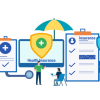- Identify Allergens: The first step in managing allergies is to identify the specific allergens that trigger your symptoms. Consult with an allergist to undergo allergy testing, which can help pinpoint the substances to which you are allergic. Common allergens include pollen, dust mites, pet dander, certain foods, and insect stings.
- Allergy Action Plan: Create an allergy action plan in consultation with your healthcare provider. This plan should include information about your allergies, triggers, and a detailed list of medications or treatments to use in case of an allergic reaction. Share this plan with family members, friends, and coworkers, so they can assist you in case of an emergency.
- Avoidance and Preparedness: Once you know your allergens, take steps to minimize your exposure to them. This may involve making changes in your environment, such as using air purifiers or hypoallergenic bedding for indoor allergens. For food allergies, carefully read labels and inform restaurant staff about your allergies. Always carry any necessary medications (e.g., epinephrine auto-injectors for severe allergies) and ensure they are not expired. Being prepared can be lifesaving in the event of an allergic reaction.
By following these allergy awareness guidelines, individuals can better manage their allergies and reduce the risk of severe allergic reactions.
#wecarepcp
WeCare








